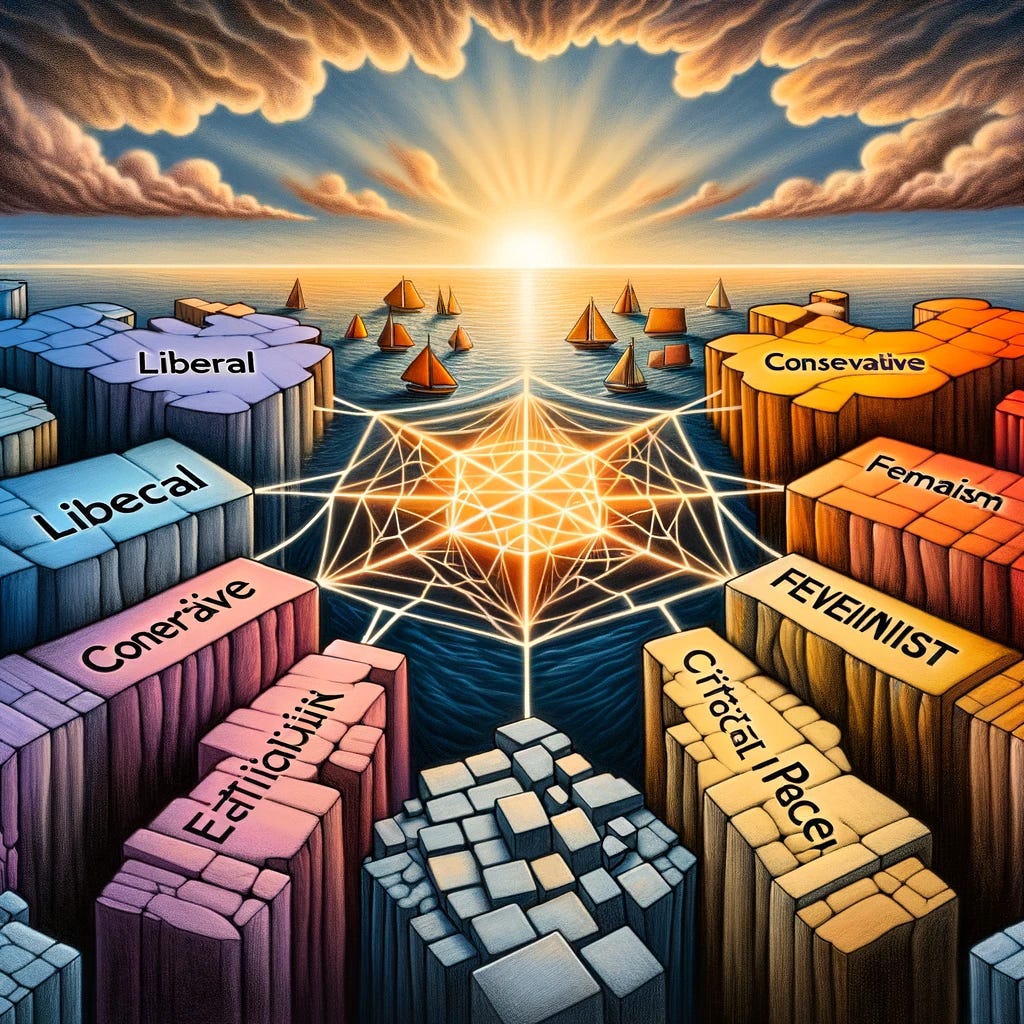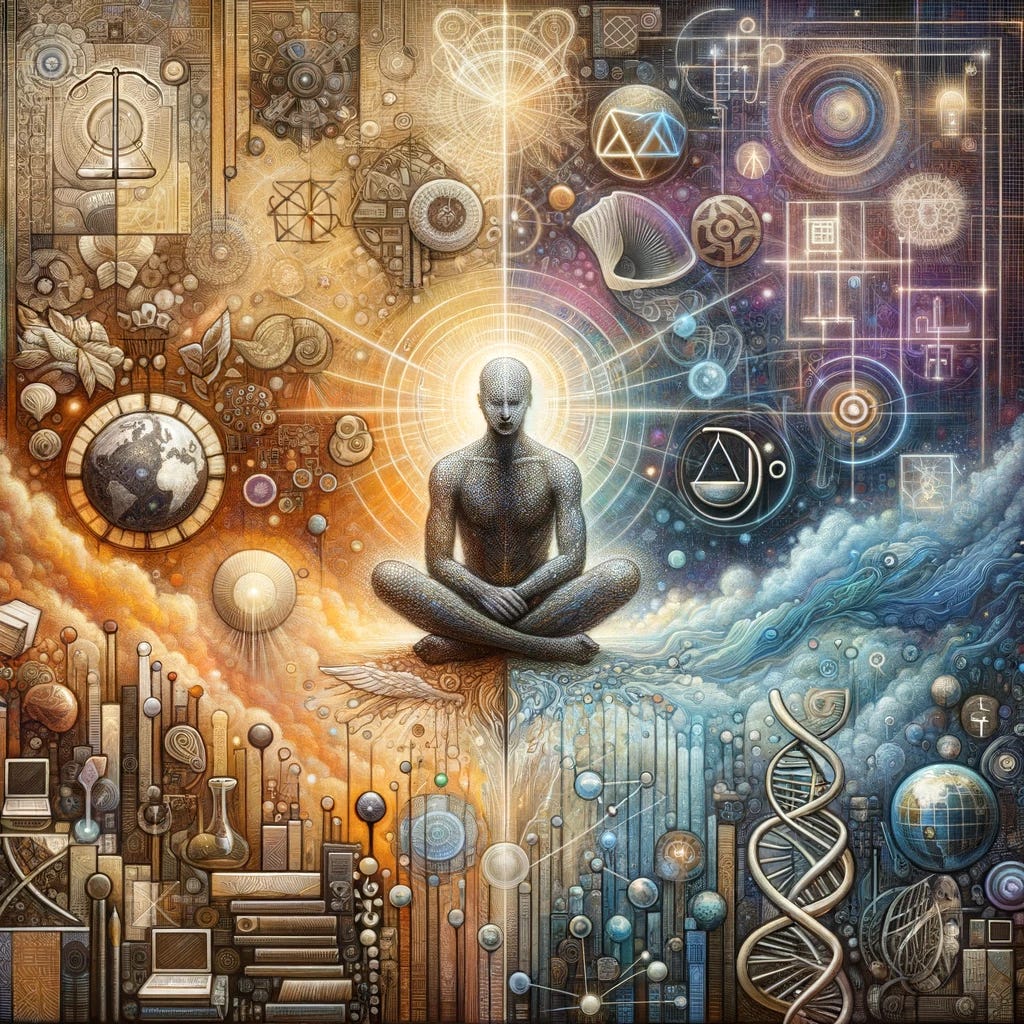Beyond the Faultlines: A Forum for Nuanced Conversations
Are you brave enough to admit that you often have more questions than answers, can’t always pick a side to barrack for, and enjoy being exposed to views that differ from your own? Do you worry that - especially now - those who believe in simple answers to complex issues risk making the challenges our world faces even greater? Do you find that, as a student or in your workplace, you are under pressure to accept a particular perspective without questioning or challenging aspects of it?
Insights from Thought Leaders
“The basic fault lines today are not between people with different beliefs, but between people who hold these beliefs with an element of uncertainty, and people who hold these beliefs with a pretence of certitude.” - Peter L. Berger
“This is about creating [a place] where learners can come together, humbled by their incomplete knowledge, curious what they can learn from others, able to share their own ideas and perspectives and eager to think together with nuance, open minds, respect and goodwill — all in service to understanding the complexities of our world more deeply.” - Heterodox Academy
“John Maynard Keynes is often quoted as saying: “When the facts change, I change my mind. What do you do, sir?” But Keynes might have done better to say: “Even when the facts don’t change, I sometimes change my mind.” - John Kay
“I believe in an open mind, but not so open that your brains fall out.” - Arthur Hays Sulzberger
There is increasing recognition of the damage being done to civil society globally and in Australia by the growth of polarised debate, partisan barracking, and rigid adherence to ideological or visceral world views. The causes of this have been widely canvassed by leading social scientists such as Jonathan Haidt (founder of the Heterodox Academy) and many others, and there is no need for repetition here.
I describe myself as a nuancist. In short, I believe that curiosity, the acceptance of doubt and complexity, respect for the good faith opinion of others even where those opinions are contrary to mine, and an understanding of the centrality of data and facts, serve us better than combative and defensive retreat to an established and inflexible framework, and the spurious comforts of belonging to a camp.
What’s the purpose?
The purpose of ‘Beyond the Faultlines’ is simple. It is to be an occasional curated digital forum that invites and publishes unsolicited contributions from the community, and solicits contributions and republishes pieces from other sources.
Importantly, and in contrast to many other sites, it will be for people as much as for pundits, and for those seeking the views of others rather than wishing to impose their views on them.
That said, it does not claim to be an entirely open forum. There will be unapologetic editorial control, initially by me, hopefully augmented by some like-minded colleagues.
Notably, however, the editorial criteria will not be my agreement or disagreement with the viewpoint presented by the contributor.
Instead, the distinctive feature of ‘Beyond the Faultlines’ will be that, unlike most other discussion sites, it will not have a view of its own, or promote, or be a platform for, particular views. Rather, the decision to publish will be a judgement of the extent to which the contribution is a ‘nuanced’ one offered in good faith, i.e., respectful, curious, and aware of complexity, the importance of data, and the legitimacy of other good-faith opinions. Of course, it will not publish extremist contributions as, by definition, extremism is the antithesis of nuance.
In essence, the forum I am proposing might be described as a place for people who don't have all the answers and still have questions to ask.
This will be a modest and tentative initiative, albeit with ambitious hopes, at least in its start-up phase.
Why ‘Beyond the Faultlines’?
Firstly, the name recognises the contemporary reality that there are significant, fundamental, and often bitter schisms within Australian society based on different values and views, reflected, and generated by, social media, populism, identity politics, and other social forces. These can be seen as fault lines, analogous to geological fault lines in which shifting plates and the gaps between them threaten stability.
Secondly, the name reminds us that attributing fault to the advocates of a view that is disagreed with has become increasingly common and a divisive and destructive alternative to true dialogue where respect for differing views can lead to better understanding and a way forward.
Dr Michael Liffman, AM
An invitation
This initiative requires readers and, at least as important, because it is a forum for conversations, contributors.
We've chosen Substack as our hosting platform for "Beyond the Faultlines" due to its widespread popularity and commitment to a "forever free" model—principles that resonate with our vision. Substack's seamless subscription service ensures that everyone, whether they wish to contribute their insights or absorb the wisdom of others, can do so with ease.
By subscribing, you'll receive our latest publications directly in your email, eliminating the need for additional account management on various platforms.
Contributions are encouraged from anyone with questions to ask, thoughts to explore, or a view they want to share, on any topic relevant to current issues. Key to the success of BTF, however - and the basis of the judgement editors will make as to whether to publish - is that contributions conform to the philosophy described earlier: that they are open-minded, curious, exploratory, informed, that facts and claims have been checked and that other views are engaged with respectfully.
Contributions may also include suggestions for re-publication material that has appeared elsewhere (subject to copyright and IP considerations being satisfied).
Less Barracking, More Nuance...
In humanity's faltering progress to understand and improve our world, we will always resort to all-embracing intellectual and emotional frameworks to assist us. Whether those frameworks are historical or contemporary, and notwithstanding the conflict caused by the contest between them and the evidence of their limited value in solving 'wicked problems', most of us employ those frameworks that we feel most affinity with - to the extent that we often barrack for them as much as think with them.
So, the enduring contest of beliefs and loyalties continues, using such enduring frameworks as liberal, labour, conservative, progressive, religious, secular, tribal, universalist, egalitarian, and so on - and more recent ones such as post-modern, gendered, non-binary, feminist, and (as the newest kids on the block) critical race theory, and intersectionalist. So deeply do we seem to need such frameworks that they cause despair to those of us who lament the way none of them do justice to the complexity of the world, and all too often impede rather than promote real inquiry and dialogue. Our current concerns about polarisation, cancellation, and populism, on both the right and the left, are only the most recent manifestation of this.
I therefore suggest we need a new template, not to replace those we already have but to overlay on to which ever is our preferred framework. The way of thinking I propose might be termed ‘nuanceism' (and yes, it's a clumsy term, but surely no clumsier than 'intersectionality'!).
Introducing Nuanceism
The idea is simple: it’s practice less so. 'Nuance' is the recognition of subtle differences, of complexity, of data, of seeing beyond simple generalisations and appearances, and of not distorting facts to fit theory. It is not threatened by complexity and doubt and prefers real understanding to glib formulae, simple explanations, and the spurious comfort of being on one side of a them-and-us debate.
Beyond Australia, instructive attempts at applying nuance to current controversies are seen in influential writers such as Douglas Murray in 'The Madness of Crowds' and Jonathan Haidt in 'The Righteous Mind’, and in the journal ‘Quillette’; locally, Walid Aly, Alan Finkel and the late Tim Colebatch come to mind. Sadly, nuance is rarely seen in our political realm, partly because the institutional basis of our parliamentary system is oppositional contest, although the growth in Independents may be an encouraging development.
Nuance is not easy. It requires curiosity, doubt, serious and difficult inquiry, comfort with complexity, skepticism about social media, and disengagement from our more visceral preferences and loyalties. It also, sadly, requires some courage because so much of our community discussion - and our personal relationships - are shaped by adherence to formulaic frameworks (often emotionally based) that determine how we view the world and from which any departure is often seen as a betrayal.
Understandably, even those who do seek to apply nuance to their thinking may feel that the knowledge and information required to properly assess competing views across the endless array of issues in the public domain is beyond what most of us can acquire. In the face of this, resort to an established framework is easier and more comfortable and helps us know who our friends are. This is, of course, undeniably true. Very few of us are experts on climate science, economic theory, epidemiology, language education, genetics, strategic policy - and so many more!
My response is to suggest that while it is rare that we will have the first-hand information and the analytic capacity to rigorously apply nuance to all the complex controversies that confront us every day, there is a fall-back position we can employ. Once we commit to nuance, we can assess if those whose claims we are considering are themselves arguing in a nuanced way. It is not difficult to distinguish between an assertion that is operating in a rigid framework that selects and shapes facts to support a position and fails to acknowledge, or indeed scorns, others - what we might term a ‘barracker’ - and an analysis that acknowledges complexity and uncertainty - a ‘nuancist’. This assessment can be applied to political leaders, radio talk-back hosts, social media, journalists, academics, lobbyists, and experts as much as to our own friends and colleagues.
Examples of applying nuancism to current concerns will make its intellectual and emotional challenge obvious, but they also highlight the complexity to which only nuance can do justice. For example...
Nuance would acknowledge a difference between a joke that draws - perhaps kindly, perhaps thoughtlessly - on ethnic stereotypes, the celebration of Christmas but not Ramadan as a national holiday, and the public abuse on a bus of a person of colour, before tarring each with the same ‘critical race theory’ brush.
Nuance would ask that, while rape is always wrong (and a women’s rights framework correctly insists on this), is there not likely to be a difference in cause and impact between a brutal assault on a random woman in the street, and a situation in which there was not explicit consent between two people in an established sexual relationship?
Nuance would admit a difference between the real and reprehensible homophobia of someone who believes gays to be evil and their sexual preferences punishable, and the misgivings of someone whose religious teachings or beliefs about family life or social stability are expressed in unease about same-sex marriage.
Nuance would acknowledge that gender dysphoria in a young child is a profoundly complex and serious matter to which no ideological framework has an easy answer.
These are but a few of countless examples where the nuance required is lacking in public and personal discussion. (I suspect also that some readers will react to them in a manner that confirms my fear that for many in our society, nuance currently is indeed a bridge too far.)
None of this should be misunderstood as a call to never have an opinion on complex issues or to be a fence-sitter - although it does caution against feeling the need to have an opinion on everything. I certainly recognise that the hesitancy that may come with a nuanced disposition might seem inconsistent with the more unqualified activist approach needed to address the wicked and urgent challenges our world undoubtedly faces.
To this I would offer two rejoinders, as well as re-stating the belief underpinning nuancism: namely, recognising complexity and good faith discussion is where truth is most likely to be found and agreed upon
The first is to recognise that nuancism in no sense denies having an opinion.
Far from being intellectual eunuchs, nuancists have better, more sophisticated opinions that they have worked hard to form rather than taking the easy shortcut of joining a team and accepting all its beliefs.
Second, for those whom, by temperament or because of the strength of their commitment to a certain view, a nuanced approach won’t cut it; I suggest there is a halfway house between nuancism and barracking, in the notion of the ‘counter-narrative’? The counter-narrative invites consideration of the opposite view to that the believer holds, at least based on ‘know your enemy’ but preferably because it might contain an insight or perspective that has some value in shaping a response.






